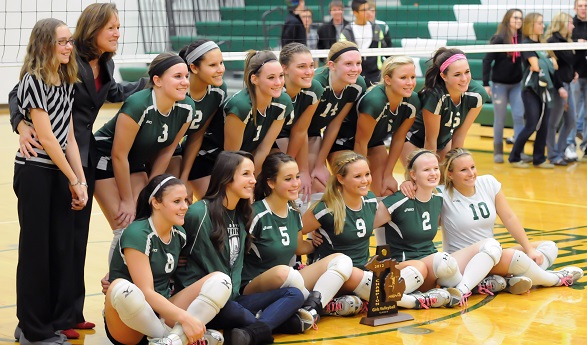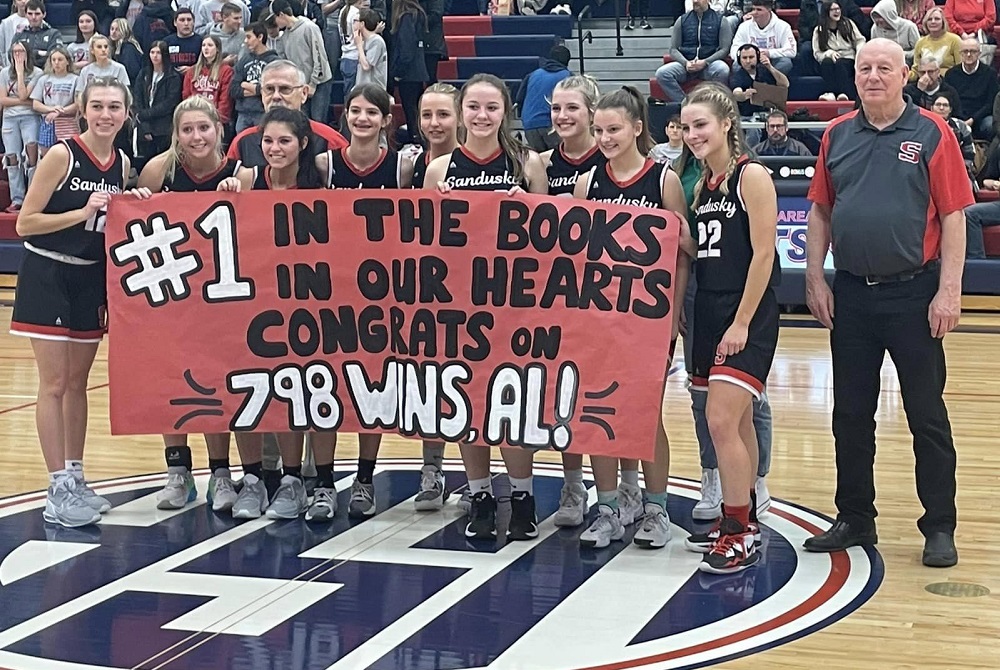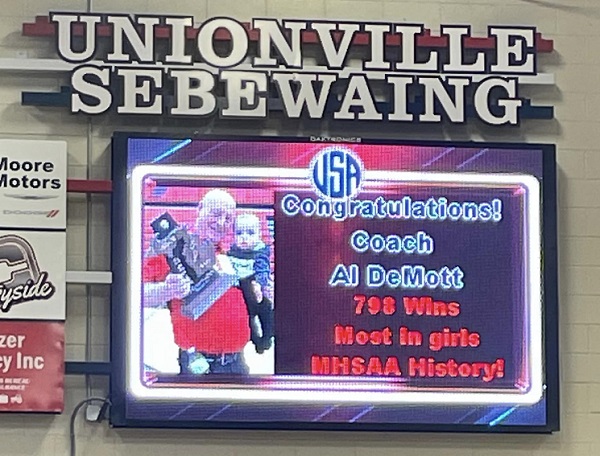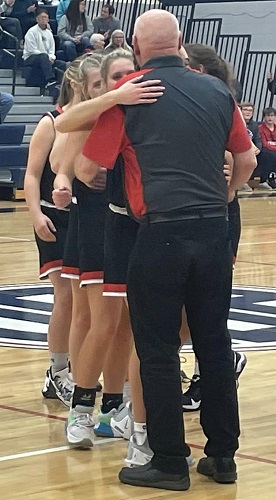
Wise Words for Coaches New (and Old)
September 13, 2013
By Geoff Kimmerly
Second Half editor
Every fall brings a new beginning for those who live by the high school calendar. And among those experiencing a new start are first-year high school coaches eager to begin their careers in educational athletics.
But what knowledge do they bring into their first coaching jobs? Most if not all played at the high school level, and many played at the college level as well. Some have served as assistants or coached youth teams. But high school coaching comes with its own set of challenges requiring an advanced set of skills – skills that are passed on annually as part of the Michigan High School Athletic Association’s Coaches Advancement Program.
To assist in giving some of our new coaches a running start, we tapped into the knowledge of three of our Coaches Advancement Program instructors for advice they give those just starting out:
 Jean LaClair began this fall 12th in MHSAA volleyball history with 861 wins since becoming a varsity head coach in 1987. She’s coached at Midland Dow, Pinconning and currently Bronson, where she’s also the athletic director and an assistant principal. She’s also served as an MHSAA official and contributed to the Women in Sports Leadership porgram.
Jean LaClair began this fall 12th in MHSAA volleyball history with 861 wins since becoming a varsity head coach in 1987. She’s coached at Midland Dow, Pinconning and currently Bronson, where she’s also the athletic director and an assistant principal. She’s also served as an MHSAA official and contributed to the Women in Sports Leadership porgram.
 Ken Semelsberger is a recent inductee into the Michigan High School Football Coaches Hall of Fame and spent 33 years at Port Huron High School as a coach and athletic administrator. He also coached football at Detroit Servite and has led teams in basketball, softball and baseball. Semelsberger returned to the Port Huron sideline four seasons ago as the varsity’s line coach.
Ken Semelsberger is a recent inductee into the Michigan High School Football Coaches Hall of Fame and spent 33 years at Port Huron High School as a coach and athletic administrator. He also coached football at Detroit Servite and has led teams in basketball, softball and baseball. Semelsberger returned to the Port Huron sideline four seasons ago as the varsity’s line coach.
 Penny Allen-Cook currently is an athletic consultant and in her fourth season coaching the Freeland varsity volleyball team. She also coached volleyball at Alma College, and is a former assistant commissioner of the Great Lakes Intercollegiate Athletic Conference. She served as an assistant athletic director at Alma College and director of compliance at Saginaw Valley State University.
Penny Allen-Cook currently is an athletic consultant and in her fourth season coaching the Freeland varsity volleyball team. She also coached volleyball at Alma College, and is a former assistant commissioner of the Great Lakes Intercollegiate Athletic Conference. She served as an assistant athletic director at Alma College and director of compliance at Saginaw Valley State University.
All were asked the following questions during separate interviews. But not surprisingly, some of their answers were similar – especially those that emphasized dealing with parental pressures and why they as coaches continue to return to the sideline every year.
Many of their answers also segued well into each other, so we’ve blended them for one longer conversation filled with wisdom beneficial to new and veteran coaches alike.
What do you tell those who are interested in becoming high school coaches?
Semelsberger: “Basically, it’s one of the most fulfilling things you’ll ever do. And it’s also one of the hardest things you’ll ever do. I try to explain that it’s not just about going to practice and coaching kids today. That’s the easy part. It’s also preparing for practice, (gaining) the knowledge of what to do in certain situations from the game itself all the way to training procedures, injury procedures and liability issues. That’s all part of the coaching realm.”
LaClair: “My biggest concern with young coaches is them getting driven out by parents really early. You’ve got to have thick skin, and you’ve got to have great relationships with parents. You can’t be afraid to talk to parents.”
Allen-Cook: “Certainly to coach is an extremely rewarding thing to do. But you can’t get into it for the money. You get into it for the things that last for a lifetime. My first year I started coaching was back in 1986, and I’ve kept in touch with those kids. (Coaching) can’t be for money or wins and losses, but the differences you make in lives.”
Semelsberger: “Probably not until after the first year do you realize all that’s entailed in coaching. (Coaches) say, ‘Once I really got into and do it, after the first time, it was a lot more than I thought.’ They say, 'What can you tell me to help me?'”
How do you encourage coaches who have become frustrated with the profession?
Allen-Cook: “It’s easier to get discouraged nowadays more than it used to be, and a common thing that discourages is the parent involvement is at a different level than it ever was 20 years ago. The key is to remember, and it’s hard for young coaches who aren't parents, but you tell them to step back and imagine what it feels like if you were the parent.”
LaClair: “I do try to get all young coaches a mentor, someone to talk with. We all get frustrated; we all have to vent, and we need the right person to talk it through with and come up with alternative ways (of dealing with situations).”
Semelsberger: “The one thing I tell them is to remember that what’s most important out there is how they influence athletes. I want to see them doing positive things with our athletes, stressing grades and sportsmanship. I hired a hockey coach once, and I told him to clean up the program. I don’t care if you win; I want our grades to be good, community involvement, and the wins and losses will come. If you stay with it, hang in there, it will come.”
Allen-Cook: “If they approach things the right way, in as few years as four or five, if they stick it out, they’ll learn the positives outweigh the negatives. I’m always encouraging them to stick it out a few more years until they can figure out their true philosophy, why they want to coach.”
What specific situations do you tell new coaches to prepare for, and how?
LaClair: “For me as a coach, the parent/athlete meeting is mandatory. If a parent comes to me with a question during the year, I say, ‘Do you remember the parent/athlete meeting? We discussed that.’ It sets the tone and tells parents how proactive you are as a person, how organized and prepared you are.”
Semelsberger: “When you’re not coaching, when you’re sitting in the stands, the parents are friendly. But once you’re on the sideline, now you’re the coach, and that changes the dynamic of the relationship dramatically. I explain to (coaches) that my philosophy is I’m dealing with parents’ most precious item. You want to treat each one of those children like you’d want your kids to be treated. You don’t have to play everyone all the time, but treat (athletes) with respect, talk to them and let them know what’s going on, why a kid isn't playing, so the kid has an idea what’s going on.”
Allen-Cook: “One of the best defenses is to be a student of whatever the game is they’re coaching so they can be seen as an expert all the time. Show it by going to clinics, reading up on things, and coming to practice with a true plan of what you’re doing every day. Parents are less likely to question if you know what you’re doing and they can see you’re a true student of the game and come every day prepared.”
LaClair: “Time management is critical. Especially for me, you need to have good practice plans, well thought out in advance so kids aren't standing around at all.”
Semelsberger: “Sometimes I tell (coaches) about reporters if the sport has a lot of reporters; always be positive, don’t be negative. ... (Also) I make sure they understand and follow the rules. Academics are the most important thing, so make sure every kid is eligible. And I tell them the most important people are secretaries and custodians. Get them on your side, and they’ll do anything for you.”
What advice do you offer coaches who also are balancing teaching or other jobs at the school?
LaClair: “Just over half of my (teachers are coaches), and that’s great. You can build a different type of relationship.”
Semelsberger: “Their number one job is being a teacher, and that’s always been the number one job. They can’t let the fact they coach take away from that. Classes are number one, and coaching comes after that.”
LaClair: “You have to think days and weeks ahead. I tell coaches who are also teachers that the weekends and a lot of Sundays are going to be for making lesson plans for the week, practice plans for the week. Then all they have to do is tweak them. Have a good plan and all you have to do is tweak, and you don’t have to do that for two hours on a Thursday night.”
Allen-Cook: “It’s a neat experience to be able to teach in other realms (like athletics). Unfortunately there are less and less teacher coaches.”
What keeps you coming back to coaching?
LaClair: “The kids. A lot of people think social media is an evil beast, and it can be. But what I love about it is I've been coaching a long time and I can keep up with former athletes all over the country, see baby pictures, things I wouldn't be able to do without social media.”
Allen-Cook: “I think once you’re a coach, you’re always a coach. It’s tough to get out of your blood. I enjoy the interaction with the young people. I’m an independent contractor now (Allen-Cook also has taught) so I have little interaction with student athletes anymore. It feels rewarding that in some way I’m having a positive impact.”
Semelsberger: “The kids, the athletes, just to watch them develop as human beings. We work hard with on our athletes being leaders in the (school) building; the first day of school our senior and junior football players were helping out the freshmen. If a kid was scared or something, trying to get where they needed to go, we had jerseys on and they knew if they saw a kid with a jersey on they could ask for help. To see those kids take on those roles ... I love watching the ninth graders come in as scared little kids and watch them leave as confident seniors going on to college or work or whatever they’ll do.”

PHOTOS: (Top) Penny Allen-Cook (second from left, back row) and her Freeland volleyball team celebrate last season's Class B District championship. (Click to see more from High School Sports Scene.) (Below) Bronson volleyball coach Jean LaClair speaks with some her players during one of her more than 1,000 games as a varsity head coach. (Photo courtesy of the Sturgis Journal.)

DeMott's Long-Revered Legacy Grows to Include All-Time Wins Record
By
Paul Costanzo
Special for MHSAA.com
January 11, 2023
This past Friday night felt like a home game for Al DeMott.
 Family, friends and former players were packed into the stands to watch him set the MHSAA record for career wins by a girls basketball coach.
Family, friends and former players were packed into the stands to watch him set the MHSAA record for career wins by a girls basketball coach.
There was a postgame celebration on the court, and a congratulatory message displayed on the video board.
Of course, DeMott and the Wolves hadn’t just won a game in their home gym – they had done it at Unionville-Sebewaing.
But anywhere in the Thumb can feel like home.
“USA, they really did a lot,” DeMott said. “They put a thing up on the board, their coach came out after the game and said all kinds of nice things. USA was a very generous host. They went above and beyond.
“That’s the way it is in Thumb basketball; we all look after each other and support each other. In all sports, really. When one team goes on a run, the whole Thumb gets on the bandwagon.”
Sandusky’s win was the 798th of DeMott’s career, putting him ahead of retired Detroit Country Day coach Frank Orlando on the all-time list.
It’s a record more than 40 years in the making, as DeMott took over the program in 1979. In that time, Sandusky has won 23 league titles, 27 District titles, seven Regional titles and earned an MHSAA Finals runner-up finish (1999). The program hasn’t had a losing season since 1982.
“I’ve been doing it a long time,” DeMott said. “Our program has had a lot of success. We’ve had a pretty good run going for a lot of years. The numbers don’t really mean that much to me. It’s nice for our program that it’s been successful as it has. That it’s been steady for a long time. There are a lot of good people that have done a good job.”
DeMott’s career record stands at 799-206, as the Wolves won another game Tuesday night to push their season record to 9-2.
Before he’s done, the record will no doubt be well above 800. How far above depends on how long DeMott sticks around. Right now, there’s no immediate plan to stop.
 “Every year, when you get done with the year and your season ends, you’re tired,” DeMott said. “But I’m still having a lot of fun doing it. Another thing, God’s blessed me with good health. I’ve been fortunate to keep going strong with this. I’ve been working on trying to get someone to take it over – I’ve got a granddaughter in eighth grade, and I would like to sit and watch her.”
“Every year, when you get done with the year and your season ends, you’re tired,” DeMott said. “But I’m still having a lot of fun doing it. Another thing, God’s blessed me with good health. I’ve been fortunate to keep going strong with this. I’ve been working on trying to get someone to take it over – I’ve got a granddaughter in eighth grade, and I would like to sit and watch her.”
One thing that keeps DeMott going is the support he gets from those around him in the program.
He’s had the opportunity to coach with his three daughters, Desiree, Allison and Marissa, who also played for him. His longtime assistant coach and childhood friend, Ray Lee, has been on the staff since 1982. DeMott said that during his time at Sandusky, he’s had only six or seven JV coaches.
“I have such a good support system,” DeMott said. “I have loyal assistant coaches.”
The community, both in Sandusky and throughout the Thumb, also has shown DeMott tremendous support, even as he was struggling to get the program off the ground in the early years.
“With the start I had here, if somebody got off to the start I did, they’d be gone, probably,” DeMott said. “It’s been phenomenal. I can’t believe all the texts and emails and calls I’ve got. People have gone above and beyond. There’s been a lot of support. We’ve always got really good support.”
And, of course, nothing can beat the support that DeMott gets at home, as his wife Tammy has been there since the beginning.
“My wife has been a saint,” DeMott said. “When I first started doing this coaching, she was a little iffy about it. When I first started, I was working at the bank and I only had two weeks vacation. We used to use one of the weeks of vacation to go to team camp. She stays up and does stats with me. She’s my biggest supporter I’ve ever had.”
All that support has allowed DeMott to build a consistent winner at a public school with an enrollment just over 300 students.
He started a youth program fairly early in his time at Sandusky, and it’s still going strong. He said there were 40 third and fourth graders in the gym this past Saturday starting their latest season.
As kids grow up in the program, they dream of one day playing for the varsity team and DeMott.
 “This achievement couldn’t have been accomplished by a more humble and deserving person,” said Haley Nelson, a 2018 Sandusky grad who played for DeMott before playing at Saginaw Valley State. “In Sandusky, playing under Coach DeMott is something you look forward to as soon as you start playing basketball in elementary school. He’s built a standard as to what Sandusky girls basketball is, and it made you want to work hard to live up to it. The program he’s built is a testament to his hard work and dedication year-round. I think it would be tough to find another high school coach as committed to their program as Al is. He sees each of his players as people far beyond what they can contribute on the court, and for that reason, the impact he has on his players extends far beyond basketball.”
“This achievement couldn’t have been accomplished by a more humble and deserving person,” said Haley Nelson, a 2018 Sandusky grad who played for DeMott before playing at Saginaw Valley State. “In Sandusky, playing under Coach DeMott is something you look forward to as soon as you start playing basketball in elementary school. He’s built a standard as to what Sandusky girls basketball is, and it made you want to work hard to live up to it. The program he’s built is a testament to his hard work and dedication year-round. I think it would be tough to find another high school coach as committed to their program as Al is. He sees each of his players as people far beyond what they can contribute on the court, and for that reason, the impact he has on his players extends far beyond basketball.”
Nelson is one of many Sandusky players who have gone onto play at the next level. Many have stayed connected to the sport through coaching, as well. But in general, DeMott touts the academic success of his program, and the pride he has in the citizens his former players have grown to be.
“A lot of our former players, they’ve all done a lot of really good things,” DeMott said. “I couldn’t be prouder. There were quite a few there (at USA). It meant a lot to see them.”
One former player-turned-coach is Wayne State women’s basketball coach Carrie Lohr, who has set records of her own. She’s in her 12th season at Wayne State, and has won nearly 200 games. She became the program’s all-time winningest coach in 2019.
She counts DeMott as one of her biggest influences.
"Al is truly one of the best coaches in the state of Michigan," Lohr said. "I believe he could coach any team or sport to its highest potential. Al has an unwavering dedication and passion for the game of basketball and teaching young people. He is selfless, positive, consistent, knowledgeable and truly cares about the players he leads.
“Playing for Coach Al DeMott is still some of my best basketball memories ever. He has truly made a positive impact on my life as he has done for so many who have worn the Sandusky jersey. I wouldn't be where I am today without his mentorship. I am forever grateful to him and his support of me long after I left the court."
With the record behind him, DeMott now hopes the focus can return to this year’s team, which is 9-2 with its losses coming by a combined five points.
It’s clear he’s excited about this group, as the energy in his voice ratcheted up when asked about his players.
“I’ve got an awesome group to coach,” DeMott said. “They’re really good, smart, hard workers. They want to be successful, and they really like to play together. They love playing together. They’re a special group.”
 Paul Costanzo served as a sportswriter at The Port Huron Times Herald from 2006-15, including three years as lead sportswriter, and prior to that as sports editor at the Hillsdale Daily News from 2005-06. He can be reached at [email protected] with story ideas for Genesee, Lapeer, St. Clair, Sanilac, Huron, Tuscola, Saginaw, Bay, Arenac, Midland and Gladwin counties.
Paul Costanzo served as a sportswriter at The Port Huron Times Herald from 2006-15, including three years as lead sportswriter, and prior to that as sports editor at the Hillsdale Daily News from 2005-06. He can be reached at [email protected] with story ideas for Genesee, Lapeer, St. Clair, Sanilac, Huron, Tuscola, Saginaw, Bay, Arenac, Midland and Gladwin counties.
PHOTOS (Top) Sandusky girls basketball coach Al DeMott stands alongside his current team after they helped him break the MHSAA record for girls basketball victories Friday at Unionville-Sebewaing. (Middle) The USA scoreboard celebrated DeMott’s accomplishment. (Below) Players line up to congratulate DeMott on his milestone win. (Photos courtesy of Sandusky High School.)

